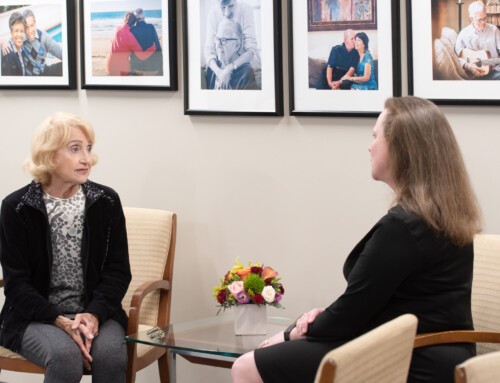
Clinical Care Coach Corner: Written by Ellen Boucher
Change can be hard on all of us. Whether the change is big or small, anticipated or unanticipated, involves one person or more than one person, change can be hard to prepare for and hard to handle when it occurs. How change impacts someone with a healthy brain will also be very different than how it impacts someone who is living with cognitive impairment. While we are often unable to predict when change will happen, or what the results could be when it does, we can anticipate some upcoming situations and how to prepare for potential outcomes. One such situation is the twice-a-year Daylight Savings time change we live with in San Diego.
How many of you groaned when reading that last line? Grumbles about losing an hour’s sleep in March and complaints about it getting dark too early in November. Concerns about children walking to school in the dark mornings or people having to drive in the dark. Statistics show that time changes are associated with increases in heart issues such as strokes and heart attacks, insomnia, depression, other mood disorders, and even vehicle collisions. It’s important to note that those statistics are about those of us living with healthy brains; time changes can very differently affect those living with cognitive impairment. How our brains receive and interpret information, as well as the ability to retain information, are increasingly impacted by the progressive nature of cognitive disorders. As a result, our responses to external changes in our environment can also be ever-changing.
Anticipating Potential Reactions
If you have responded to the time changes in the same way every year, perhaps this is a good time to consider anticipating what bothers you about those two times a year and seeing what you can change about your thoughts and actions. Perhaps you cannot stop an immediate negative thought, but can you learn to catch it and replace it with a positive thought? If you hate it getting dark early, is there something you can do about the lighting in your home that can help you to feel cozy and safe? If you can remember then you can prepare to have a better experience when it comes time to change that clock. Living with a healthy brain can make preparing that simple.
For those living with cognitive impairment and an ever-changing brain, anticipating and preparing is not so easy. The way your brain interprets sensory information will persistently vary, which can make it hard to anticipate and prepare for a particular response to external stimuli. As we approach this coming time to change the clocks, let’s consider some potential reactions you, and those around you, can be aware of and have an idea how to respond. While doing this, it is important for us all to recognize that adjustment and change can be more difficult for individuals living with cognitive impairment. It is the responsibility of the person living with a healthy brain to respond in a way that is understanding and supportive.
The upcoming time change in November, as well as the continuous decrease in sunlight hours before then, can bring about unsettling situations due to the changing of the light. As the sun moves position and it begins to get dark earlier, people who are interpreting the light and shadows differently may:
- Begin to walk slower and step differently fearing they will fall into a hole in the ground or will need to step around a hole. (Shadows are visually interpreted differently.)
- Begin to want to close the drapes in the home sooner than necessary and/or show other signs of increased agitation/anxiety. (Longer shadows can initiate a loss of feeling safe and secure.)
- Begin to want to turn on the lights earlier in the day – even with the drapes left open. (Decreased sunlight in the Fall and Winter creates the need for additional light.)
Setting the clock back one hour can also:
- Cause confusion about mealtimes that have been pushed back by one hour. (Short term memory issues prevent an ongoing understanding of why the food is late.)
- Cause some to inquire when the “kids are coming home from school” or other family provider experiences. (People will connect the position of the sun with school days and can “live” from that period of their memories.)
- Cause chaos with a sleep schedule. (Going to bed an hour later and getting up an hour later is a big change for everyone.)
These are just a few examples of how the time change can be interpreted differently by a brain experiencing cognitive impairment, and there are endless other possible responses.
Facilitating an Easier Transition
Whether we are living with a healthy brain or one that has a cognitive disorder, we are all aware that what we say/do and what we feel do not always match. So how can one support an individual who is demonstrating discomfort or fear that is new or perhaps worse than in the past? Begin with validating what the person is expressing, while considering what the underlying need might be. Remember, the person may respond with something they vaguely remember from the past or may be repeating what others around them have expressed; they may not be able to share their true personal experience at that moment. For example, someone beginning to close the drapes at 3:00 p.m. might answer the question, “Why are you closing the drapes now?” with “It is getting dark.” After validating that statement, consider a need for more light prior to 3:00 p.m. so that there is an easier transition to the time when the sun sets or perhaps create a space of with lots of light where the individual could spend the middle part of the afternoon in doing something that keeps their attention away from the changing position of the sun.
The changes mentioned here are about the “falling behind” as we turn our clocks back. Those are a little easier to anticipate, but the journey of dementia holds many unexpected and unpredictable changes. Each situation is unique, and it is valuable to have a large toolbox prepared with different ideas and responses for all types of situations. So how do you fill your toolbox in advance? Participate in our education classes, support groups, and call the office at 858.492.4400 to speak directly to one of our Clinical Care Coaches (Spanish speakers available as well). You are not alone on this path – Alzheimer’s San Diego is here to support you!
Our “Clinical Care Coach Corner” series is where our team of dementia experts weigh in on unique topics and provide insight that can help people impacted by dementia.




